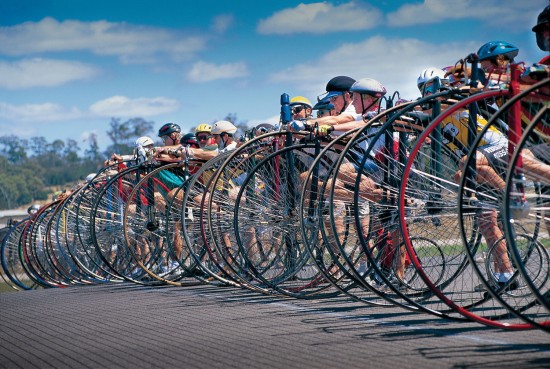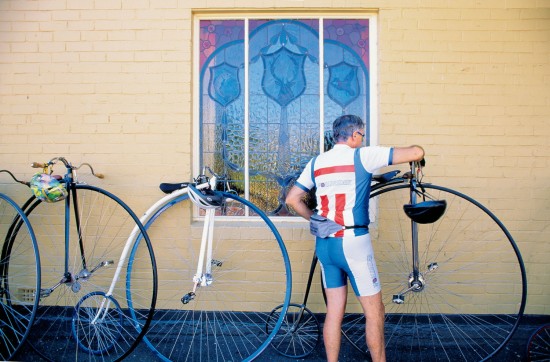Tasmania is not only a beautiful state in which to travel; every now and then you can stumble across places, events and snippets of history which are, well, just a little “different”. And you often don’t have to travel far to find examples of the island state’s unique character.
When the invasion of Iraq began in 2003, Bagdad was bombarded by internet messages of sympathy and support from around the world. Confused web users choked its Online Access Centre, not realising it was a small town of 650 people, 40km north of Hobart.
Bagdad isn’t the only town in Tassie with a rather unique name. There’s Doo Town, just past Eaglehawk Neck on the way to Tasman’s Arch, where locals have given their holiday homes names like Gunadoo, Doodle Doo, Love Me Doo, Doo Us, Doo Me, Doo Nix, Wee Doo, Xanadu, Rum Doo and Doo Little.
Driving south from Hobart along the Channel Highway, you will come across the little town of Snug, which was given its cute name in 1908 by not-so-cute sailors who found “snug” anchorage for their ships in the D’Entrecastreaux Channel. There are odd-named towns in the far-flung corners of Tasmania, everything from Daisy Bell to Egg and Bacon Bay, Flowerpot, Jetsonville, Milkshake Hills, Nook, Nowhere Else, Needles, Ouse, Squeaking Point and Tomahawk.
But for some real eccentricity, you can’t go past a town with, by comparison, a fairly ordinary name – Evandale.
The good folk of Evandale have added their own twist to Tassie’s tourist attractions by playing host to the National Penny Farthing Championships. Now in its 32nd year, the Annual Evandale National Penny Farthing Championships will be held on February 22, 2014, from 10am to 4pm. If you are thinking of heading to Evandale, that’s the time to visit.
Continuing a tradition which began in 1983, the town comes alive with the Evandale Village Fair, which includes a full program of Penny Farthing bicycle races which attract enthusiasts from all over the world. The National Penny Farthing Championship features the fastest eight riders out of heats run over four laps of the town circuit, covering 1.6 kilometres.
There are also separate championship races for ladies, juniors (under 16), veterans 1 (50+), 2 (60+), 3 (70+); a Slow Race (last over the line wins); Slalom (two at a time around witches’ hats); Novice Race (first time riders); Sprint (200m dash); Relay (teams of 4, one lap each); Biathlon (run one lap, ride 2, run one); Miss ‘n Out (last rider on each lap eliminated); Obstacle (run, carry bike, wheel bike, sprint); Consolation (for those who haven’t won a medal).
The day of racing and fun also includes food and produce stalls, entertainment, puppets, dancers, pipe bands, clowns, pony rides, vintage cars and historical machinery displays, including steam engines.
Racing around Evandale on Penny Farthing bicycles is an easy pastime compared to that faced by early colonials tackling Bust-Me-Gall and Break-Me-Neck hills. Both hills are located on the road from Hobart to Orford and while the exact derivation of their names is unclear, it is believed they came from early settlers who travelled the east coast with bullock drays carrying supplies.
Getting over Bust-Me-Gall Hill often meant riders had to dismount their horses or drays to relieve the struggling animals, both on the way up and on the steep road down. Break-Me-Neck is believed named after an exclamation made by a wagon driver on his first encounter of the steep hill.
If all this quirkiness hasn’t piqued your interest, here are a few more odd facts. Tasmania has the cleanest air in the world (measured at Cape Grim on the northwest coast); it was the first Australian state to introduce a compulsory education system in 1868 and Coles Bay, on the Freycinet Peninsula, was the first town in Australia to ban plastic bags in 2003.
Australia’s oldest brewery, Cascade Brewery, is in Hobart; Australia’s oldest golf course is at Bothwell in the Tasmanian midlands; Tasmania has the lowest crime rate of any state in Australia; the nation’s first legal casino was opened in Hobart in 1973 and the world’s smallest marsupial, the pygmy possum, is native to Tasmania.
Oh yes, and the first French black truffle was dug up in northern Tasmania in 1999, the result of years cultivating the state’s truffle industry. The truffles are grown under oak and hazelnut trees and the very expensive “black nuggets” are now farmed by some 30 growers and hobbyists. There are two reasons truffle growing has taken off in Tasmania – the state is roughly on the same latitude in the southern hemisphere as France and Italy are in the northern hemisphere and Tasmanian truffles are harvested in the European off-season, and as such, enjoy a virtually competition-free world market.
You really should get down to Tasmania and take a look.
For more information, visit Discover Tasmania
Photo Credits
Dr Doolittle – a Doo Town shack © Tourism Tasmania/Dan Fellow
Evandale village © Tourism Tasmania
National Penny Farthing Championship 1996 (1) © Tourism Tasmania/Ray Joyce
National Penny Farthing Championship 1996 (2) © Tourism Tasmania/Rob Burnett
Penny farthing bicycle outside the Clarendon Arms Hotel© Tourism Tasmania/ Justin Malinowski
Penny farthing bicycle © Tourism Tasmania/Michael Walters
National Penny Farthing Championship 1996 (3) © Tourism Tasmania/Ray Joyce
Penny farthing bicycle (2) © Tourism Tasmania/Michael Walters
National Penny Farthing Championship (2) 1996 © Tourism Tasmania/Rob Burnett
Featured Image – Penny farthing bicycle outside the Clarendon Arms Hotel © Tourism Tasmania/Brian Dullaghan










What a fantastic read! Tasmania sounds like such a quirky and fascinating destination, with its unique wildlife, stunning landscapes, and rich history. The way you’ve described the mix of natural beauty and quirky cultural elements really makes me want to experience it for myself. It seems like Tasmania has something for everyone, from adventure seekers to those who appreciate the slower pace of life. This article truly highlights why Tasmania should be on everyone’s travel radar!… oh how i wish to travel there!!
Great pics!
Now how do I fit this into my travel budget! Long way from Kentucky!